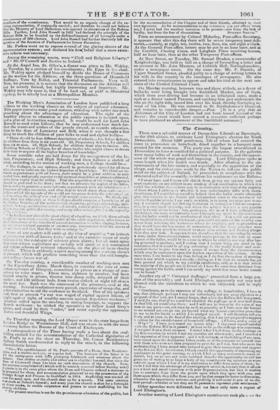The Working Men's Association of London have published a long
aildress to the working classes on the subject of national education. This paper contains some good notions, mixed up with rather too much preaching about the advantages of education. The right of the humbler classes to education at the public expense is insisted upon, and a plan of instruction suggested. It would be well for Lord John Russell to read what follows, that he may understand how much fur- ther the wants and wishes of the people extend, as regards education, than in the days of Lancaster and Bell, when it was thought a fine thing to teach the children of poor folks to read and cipher badly- " There should be four different descriptions of schools,-1,.t, Infant Schools, fur children from three to six years old. 11, Preparatory Sellouts, fir children from six to nine. 3d, High Schools, for children from nine to twelve. 4th, Finishing Schools or Colleges, for all above twelve who might choose to devote their time to acquire all the higher branches of knowledge."
Some sensible rules are laid down for the mailagement of the In- fant, Preparatory, and High Schools; and then follows a sketch of what, according to the notion of working men, a College should be- " The Colleges, in our opinion, should be gratuitously opened for all those who choose to cultivate the highest branches of kuowledge. tie think an in- timate acquaintance with all known facts would be a great addition to anti- (plated lore, and greatly superior to the mystical absurdities at present cultivated, more front vauity than for utility. That the acquisition of the living 1 inguages should he Famed to the dead ; not that we advocate the neglect taf the latter, but in order to promote a more intimate acquaintance with the inhabitants ah 1 literature if other countries, and thins /Op to break flOWIt thaSt 11411icht4i Fr, judiccs wtich the tyrants to.f the world are too prone to take the advantaqe ivflonenting Me evils of war and al its terrific conscquencts. We thiok, fur- ther, that the education at these Gdleges should comprise abnowledge of all the higher branches of the insthematies, chemistry, geology, milieralogy, agri- evitore, botaoy, arellitecture (civil and naval), natural philosophy, the seieuee of govvronteut, puhincal coonomy, awl excry other science Pio.; to the capacity "lit furtLetmce also of the great object of education, we think those schools ssitil he open every 4 Ve:::11g, to eauloe all the adult population, who choose to nal themselves of tic benefits of mutual instruction secieties, singing-, lectures, m any other rational pursuits or amusements, unassociated with the means of xi.eation mal vice, that they wish to indulge in."
Some of our readers will smile at the idea of acquiriog " an intimate acntint.o,ce with all known facts," and at the exteusivo range of study haiieated in the catalogue of sciences given above; but all must agree that men whose aspirations are so lofty will sneer at any contracted atal vulgar scheme of national education, on the phi!' of mere charity 5C11001S. There is evidently a spirit moving among tie working classes at present, which will produce something more than the self-compla- cent ruling classes wot of.
On Tuesday evening, a considerable number of working.men met at the Canterbury Arms, Marsh Gate, to consider the case of some cotton-spinners of Glasgow, committed to prison on a charge of con- spiracy to raise wages. These men, eighteen in number, had been treated cruelly in prison, thrown into damp cells, stripped of their clothes, and left without beds. fir:nu twelve o'clock at night till eleven the next day. Such was the statement of the prisoners, rend at the meeting. Several resolutions were passed, expressive of sympathy, and a determination to aid the workmen in Scotland. One of the speakers slid, that at present "a war was waged of capital against labour, of might ligniont right, of wealthy masters against dependent workmen." Another called upon the meeting, in strong language, to suppott the Scotch workmen : he wisbed the operatives to follow Lord Grey's advice, and stand by their "order," and resist equally the oppressive 'furies and deceitful Whigs.


























 Previous page
Previous page